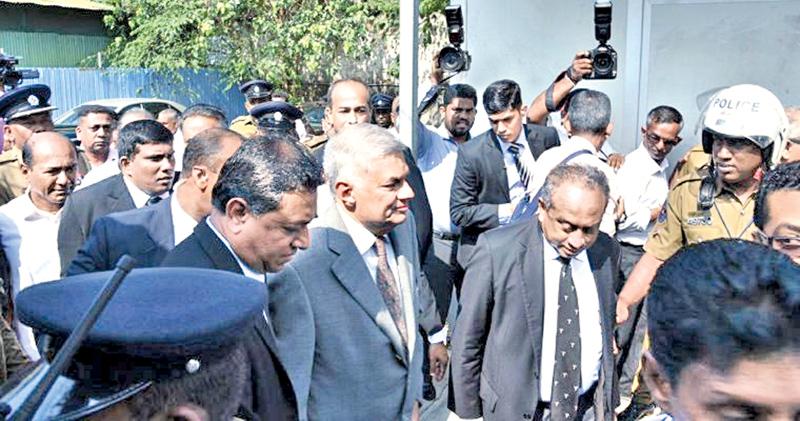
Turning over a new leaf in the history of politics in Sri Lanka, Prime Minister Ranil Wickremesinghe testified before the Treasury Bond Commission last Monday (20) and revealed that the unaccounted expenditures by the previous regime had created a “crisis situation” in the country when the new government took office in January 2015.
Speaking further Prime Minister Wickremesinghe pointed out that, even after the elapse of two years, the country is facing the repercussions of such secret accounting practices of the previous regime. The Premier revealed that a Singapore Company made a claim the previous week for work they had done in 2013 – 2014 for the Northern Expressway development project. The debt was not included in the Appropriation Bill and the authorities were unaware of it till the foreign company asked for its money last week, PM Wickremesinghe explained.
The Prime Minister made these observations when the Tribunal sought clarifications on the debt requirement of Rs 13.5 b as at March 2, 2015 and the additional requirement of Rs 15 b determined and discussed at several meetings held prior to the February 27, 2015 Treasury Bond auction. The Prime Minister explained that these were two different fund requirements and informed the Commission that the present government was left with large amounts of debts which needed to be funded immediately.
“What had happened in the previous years was that there had been many projects approved, which were not shown in the Appropriation Bill, simply because of IMF limitations. So you got around IMF limits by not including them in the books,”the Premier pointed out. He said, the present government had to pay for two streams of payment; what is in the Appropriation Bill and others which are outside that.
Further speaking on the matter, Premier Wickremesinghe said, for 2015, about 75 to 100 b rupees had to be paid in respect of the Highways alone. He informed that the government still had a liability of 500 to 600 m dollars for funding debts, thanks to the ad-hoc accounting of the former regime. He also said, a forensic examination on this issue is being conducted at present.
The Tribunal and the Attorney General sought clarifications from the Premier, based on the answers provided by him in the two affidavits in response to questions put forward by the Commissioners. The Prime Minister was requested to clarify on his awareness of the Perpetual Treasuries Company structure and the conflict of interest between the then Governor of the Central Bank Arjuna Mahendran and his son in law Arjun Aloysius. The Premier said, he did not have an extensive awareness of the Perpetual Group and went on to say that Mahendran assured him that there would be no conflict of interest between him and his son in law. The Prime Minister said, he was informed that Aloysius in fact stepped down from his post as Director of Perpetual Treasuries Ltd.
The Tribunal sought clarifications from the Premier about telephone calls from Mahendran, which transpired as evidence in the previous week’s proceedings. The PM pointed out that he could be contacted through the telephone number recorded in evidence and several others, but he was not able to answer all the calls. Justice Chitrasiri asked if the Premier could recall the content of the four calls which had transpired in evidence.
“I can remember… He did tell me not to worry and that there is enough money raised. Then in the afternoon he gave me a call to give me details of what had happened at the auction and that they had taken 10.5 B rupees at the auction. However, I cannot remember all four conversations,” Wickremesinghe said.
Attorney General Jagath Jayasooriya requested Premier Wickremesinghe to clarify the steps he took to probe the Treasury Bond issue and if he looked for reassurance that there was no conflict of interest between Mahendran and Aloysius. The PM pointed out that he appointed the Gamini Pitipana Committee and then let Parliament conduct an independent inquiry into the matter without him intervening.
Meanwhile, Premier Wickremesinghe also informed the Commission that there is a process of drafting a new monetary law taking Central Bank inputs and foreign consultants’ opinions into consideration.
The Prime Minister also submitted three documents to the Commission on liability management, low inflation and also the IMF agreements on macro-economic liberalization integrated in the local economic policies.
Several Ministers, including Mangala Samaraweera, Rajitha Senaratne, Sagala Ratnayake, Kabir Hashim, Malik Samarawickreme, Akila Viraj Kariyawasam, Arjuna Ranatunga, John Amaratunga, Jayawickreme Perera, Dhaya Gamage, P. Harrison, Mano Ganeshan and a number of parliamentarians were present at the proceeding. The Commission terminated recording evidence following the Premier’s testimony. It is to submit its report by December 8, 2017.
